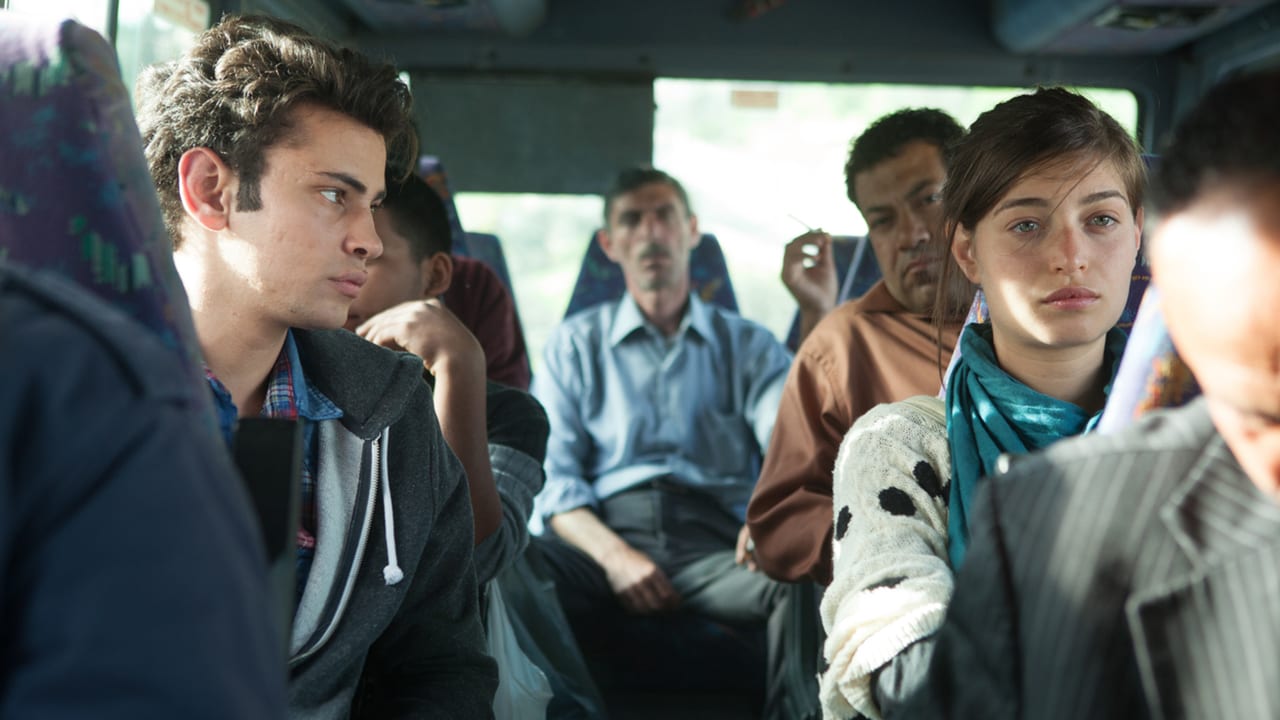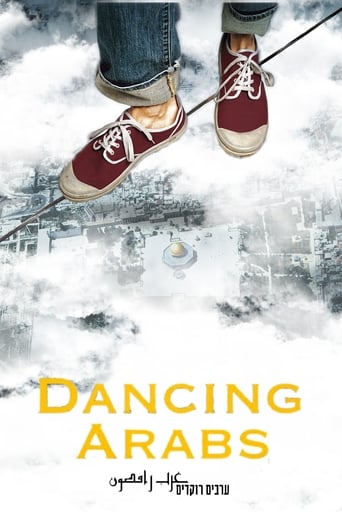Protraph
Lack of good storyline.
Konterr
Brilliant and touching
Holstra
Boring, long, and too preachy.
FrogGlace
In other words,this film is a surreal ride.
kosmasp
Actually that is not true, but it does have a premise that is easy to relate to and if you have the quality writing engage the viewer to be interested in the story. And this has the quality to pull it off. It's not an easy movie to watch, though that doesn't mean, we don't get lighter scenes too.Of course the conflict is there and the characters have to deal with a history, that is so complex that one movie alone could not do justice to it all. You have to really engage this open minded and not blinded by one side and see one side as bad or worse than the other. This is a human story after all and it plays out like that. You really feel for the main characters and their struggle, something the movie is really adamant on showing the viewer ...
MartinHafer
Making a film in Israel with Palestinians is problematic. After all, the film could be seen as either too pro-Jewish or too pro- Palestinian by some and as a result, lose a major portion of the potential audience. However, "A Borrowed Identity" manages to create a story that both sides of the ideological perspective could appreciate and enjoy.The story is about a Palestinian boy, Eyad. You see him grow to his teen years through the first portion of the film and he's so bright that he's offered admission to the best school in Israel--and he'll be the only Palestinian in an otherwise all Jewish program. The film follows the young man through high school from his early awkward time to acceptance by his peers until he ultimately does something a Palestinian isn't supposed to do--fall in love with a Jewish girl. At first, things look great for Eyad and his girlfriend, Naomi. However, she is hesitant to tell her parents about her boyfriend and he's also hesitant to tell his family as well. When he loses her over this, he decides on another path...and it involves pretending to be Jewish so that his life will be easier.There is a lot to like about this film as is touches on some divisive topics. It's not just the Palestinian/Jewish conflict but there's also a subplot involving quality of life issues for a friend of Eyad. Yonathan has Multiple Sclerosis and through the course of the movie, he becomes less and less functional until he's just a shell of who he once was. All of this makes for a fascinating film that I enjoyed and which was mostly well crafted. I say mostly because Eyad was played so incredibly detached and non-emotive through so much of the film--a bit too much for me, as this tended to make him seem less real. But the good far outweighs the bad with this one and it's a film that is totally unique and captivating.
nahar34
I've lived in Israel for many years an see things from a Jewish Israeli point of view. It was interesting to see this movie about this conflicted young man. I appreciate the honesty of the script writer about the hostility many Arabs feel toward the Jews.(In Israel most Israeli arabs pretend this hostility doesn't exist) I also liked the unexpected story line and the teens relationship with the sick boy's family. I feel like this movie needs to have a continuation. Now that he has a new identity, it would be interesting to see how his life evolves. The only thing I didn't like was the constant discussion about his Arab identity. There are other way to show hostility, without actually repeating the same cliché.I'll explain this to people who don't speak Hebrew: When the Arab boy first goes to the Jewish school, he has a strong accent. The kids laugh at him. Later his accent disappears and he speaks Hebrew just like other Israelis.
maurice yacowar
Eran Riklis manages a touching humanist film that should engage and expand both sides of the Arab/Jewish divide in Israel — and beyond.It follows a bright young Arab boy Eyad, whose intelligent father — consigned by his earlier political activity to a career as fruit-picker — gets him into the country's premier Jewish high school. With that family as its centre the film obviously reveals the Arabs' difficulties in the (understandably) wary Jewish country. The Arabs make up 20% of the population, so they understandably chafe at soldiers checking their IDs and teachers' snide remarks and the conviction the system is prejudiced against them. Arabs steam in the kitchen while the Jewish boys get the better paying jobs as waiters. As Eyad's father summarizes it, "We want to live in dignity." Eyad's experience broadens when a community service project leads him into a friendship with Ionathan, a Jewish boy crippled with MS. He also has an affair with a bright, pretty Jewish student, Naomi, whose parents pull her out of the school to end their contact. To enable her to return, Eyad gallantly leaves the special school and studies for his exams on his own, while working in restaurants. His father disowns him in anger and disappointment.Riklis is careful to present the Jews' perspective as well. An Arab teacher teaches the map of Palestine — denying Israel — then unrolls the Israel map when the Jewish principal enters. Eyad's father and friends are certain Saddam Hussein will repel the US attack and destroy Israel in a few days. His mother knows better. The Arabs dance on their rooftops when they see the scud missiles fired at Israel.But that image does not explain the title. As Riklis told the Palm Springs festival audience, he had two other contexts in mind. Mainly the phrase suggests the Arabs' restriction to servicing (figuratively: dancing for) the Jews, whether in the kitchens or cleaning up their mess (as Eyad more heroically does for his stricken Jewish friend). He also recalled the Jewish proverb about not being able to swing one behind at two weddings at the same time. Servant Eyad is indeed torn between two dances, the Arab and the Jewish, when he ventures beyond his enclave. At school his summary of the 1948 war is the Jewish version, unshaded, but in a later discussion of Jewish contemporary fiction he details the conventions of Arab stereotypy.The two boys' mothers provide the film's moral center. Eyad's Arab mother — who has the stereotype Jewish nose — tacitly supports her son's love affair with the Jewish girl. Her concerns give way to her love and support. Ionathan's mother embraces Eyad for the comfort and life he brings her worsening son. When Ionathan nears the end, Eyad uses his passport to assume his Jewish identity, getting a waiter's job, then opens a bank account in his name to deposit the checks. Ionathan's mother is initially disturbed to discover that ploy, but when she confronts him she immediately softens at his need and promises to keep his secret. In response Eyad writes the high school exams both in his own name and in Ionathan's, securing both their graduations with identical honours. Eyad loses his beloved grandmother. Naomi denies him to win a spot on the Special Intelligence army unit. Eyad goes to university in Berlin, returning for Ionathan's last days. Then comes the film's astonishing climax. It's completely unexpected and yet perfectly inevitable. Ionathan's mother gives her son a Muslim burial under Eyad's name, to enable Eyad to pursue his life under her son's name, freed from the stigma of being an Arab. As Eyad's mother accepted her son having a Jewish lover, Ionathan's embraced her son's Arab friend. She asks him to live with them to ease her strain. Her climactic gesture reverses but fulfills the remarkable prophecy by Golda Meir: There will not be peace until the Arabs decide they love their children more than they hate the Jews. Both boys mothers' realize that; Naomi's doesn't. The message is that peace will be impossible unless both sides abandon their traditions of hatred and war. This Jewish mother abandons her religious tradition, turns her back on the past, to ensure a better future for the next generation of Jew and Arab together. We know her feeling for her Judaism from their sabbath dinner with Eyad. So we gauge the sacrifice she makes for her son's friend. Of course, in assuming the Jewish identity Eyad also abandons his past, including his family and culture. So profound is the schism that only a break with the past will bridge it. Eyad's elementary school is visited by a fatuous presenter of some Children for Peace movement. The film's climax plays out the deeper implications of that hope.

